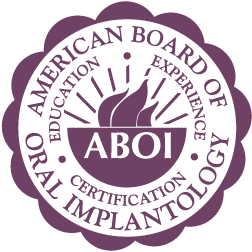One of the primary advantages of dental implants is they can be cared for almost the same as your natural teeth. But it’s still important to keep certain factors in mind and follow any instructions from your dentist after implant surgery.
Explore our guide to learn some helpful tips from Dr. Grubb about preserving your implants.
What to Expect after Dental Implant Surgery
Understanding what to expect will help you feel confident and secure about the dental implant process. It’s important to remember that some pain, swelling, and bleeding are common parts of recovery.
Patients typically encounter a bit of swelling after the implant fixture is placed. The swelling usually reaches its highest point 2 to 3 days after surgery. However, your level of pain should peak about 6 hours after surgery.
You can use medication and an ice pack on your cheekbone to counteract any pain or discomfort you’re feeling. Remember to only take medications that are prescribed by your dentist and strictly follow the directions that come with your medication.
Bleeding is another common side effect of dental implant surgery. Blood may continue to leak from the surgical site for up to two days following the operation. Apply a pad of gauze to minimize this and change it out as necessary.
Post-Operative Recovery
After your dental implants are placed, Dr. Grubb will give you a small set of instructions for your first few days of recovery. It’s important that you follow these instructions closely if you want your implants to last. These instructions will include:
- Don’t spit, use a straw, or put pressure on your implant area in any way to avoid setting back the healing process.
- Don’t eat hard or chewy foods while your implants are still healing. Limit yourself to soft foods and clear liquids for a few days.
- Rinse your implant area with salt water three times a day to keep it clean and reduce inflammation.
- Avoid smoking or drinking alcohol for a few days. These activities decrease your blood flow and interfere with the healing process.
Long-Term Implant Care
After you’re fully recovered from surgery, caring for your dental implants becomes much easier. If you want your fully restored smile to last a lifetime, here are some tips to keep in mind:
Use Gentle Oral Care Products
Unlike other tooth replacement options, dental implants can be brushed and flossed like your natural teeth. However, we recommend that you use gentle cleaning products. Avoid whitening toothpaste and similar products — these contain abrasive materials that can damage your implant. We also recommend using nylon floss because it’s gentle on your gums.
To complete your oral care routine, rinsing with mouthwash is a good way to remove any leftover bacteria. Avoid brands used for whitening or containing alcohol, as these will dry out your mouth.
Visit Your Dentist Regularly
Visit your dentist at least twice a year for cleanings. Besides maintaining your general oral health, these visits allow dentists to identify any potential problems with your implant before they develop into a larger issue.
Protect Your Gums
Without healthy gums, dental implants can’t succeed in the long-term. If you develop gum disease, the bacteria can spread through your gums and infect the tissues surrounding your implant. This condition is known as peri-implantitis and it can lead to bone loss or even total implant failure without treatment.
Visit Dr. Grubb for Dental Implants
If you want to restore health and beauty to your smile, there’s no better option than dental implants. Contact our practicein Havre de Grace and schedule a consultation with Dr. Grubb — rest assured, we’ll take care of your smile.
Frequently Asked Questions
What is the best way to clean dental implants?
Whether you have a single-tooth restoration or a full arch of implant-supported dentures, you still need to brush your teeth twice a day and floss daily. When brushing your teeth with dental implants, be sure to use a soft toothbrush with nylon bristles, and avoid abrasive products like whitening toothpaste.
It’s very important to brush not just the replacement tooth attached to your implant, but also around the attached crown, where it’s common for bacteria and plaque to accumulate.
Is there a certain way to floss with dental implants?
When you floss with dental implants, go with nylon floss (often marketed as “crown and bridge” floss), which is gentle on the gums. Rather than pulling the floss straight down to remove it from between the teeth, gently pull the floss through the teeth to avoid damaging crowns.
Is bleeding around dental implants normal?
You can expect the site of a dental implant to bleed a little in the first few days after surgery. However, bleeding after dental implants have healed is likely a sign that the soft tissue around the implant is inflamed. Like gum disease, inflammation of this soft tissue may not cause you any pain, but this doesn’t mean it’s not an issue.
Bleeding around dental implants is usually a result of bacteria that causes inflammation known as mucositis. In the early stages, this is easily treated with good oral hygiene. If mucositis is allowed to progress, it could develop into peri-implantitis. This is a very serious condition that could lead to loss of bone and soft tissue or even total failure of the dental implant.
If you experience any symptoms that indicate you have gum disease, it’s vital that you contact our office immediately by calling (410) 939-5800. Responding in a timely manner will allow us to treat the gum disease before it becomes problematic.
Are there foods I should avoid eating with dental implants?
Dental implants function just like natural teeth, which means that foods that may damage teeth might also damage implants and crowns. While there is no specific list of foods to avoid eating if you have dental implants, you should be aware that some foods do have the potential to chip, crack, or damage any teeth. Foods you should be careful when eating include:
- Popcorn
- Ice
- Hard candies (don’t bite them if you can help it!)
- Chewy foods, like taffy and caramel
- Foods likely to stain your implants– coffee and red wine




